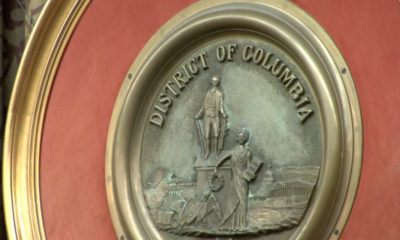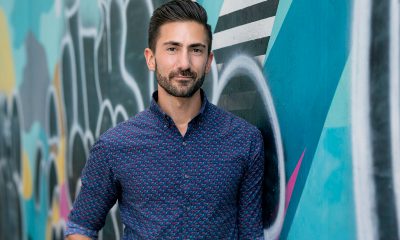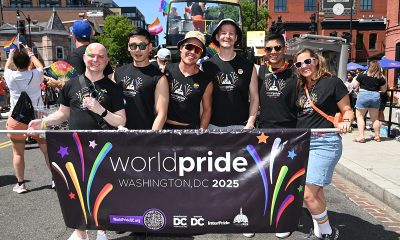Local
Catania, Graham breeze to victory; 7 gays win in Md.
Fenty write-in votes high in gay precincts
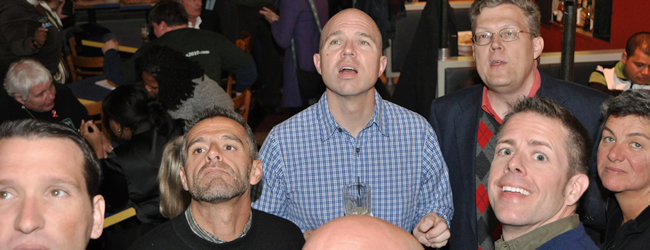
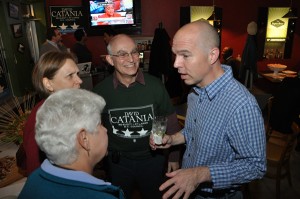
David Catania's re-election to D.C. Council was one of the few bright spots on an Election Day widely regarded as a disaster for gay rights. (Blade photo by Michael Key)
Pro-gay D.C. Council Chair Vincent Gray won his race for mayor with 73.9 percent of the vote and gay Council members David Catania (I-At-Large) and Jim Graham (D-Ward 1) easily won re-election Tuesday.
But an unauthorized write-in campaign for Mayor Adrian Fenty, who lost the Democratic mayoral nomination to Gray in the Sept. 14 primary, yielded high write-in vote counts in nearly all voter precincts with a high concentration of gay residents.
In Maryland, the number of out gay or lesbian members of the state legislature increased from four to seven in Tuesday’s election. Among the winners is Mary Washington, who captured a House of Delegates seat from Baltimore to become the first black lesbian to win a seat in the Maryland Legislature and the second to hold that distinction in the nation.
The “write-in” category in the D.C. mayor’s race won in at least two precincts with high concentrations of gays on Capitol Hill, highlighting the same racial divisions among voters that surfaced in the primary, where Gray won in majority black sections of the city and Fenty won in majority white areas.
Most of the gay precincts are in majority white sections, such as Dupont Circle, Adams Morgan, Logan Circle and Capitol Hill. Activists familiar with the LGBT community have said black gays, like their straight counterparts, supported Gray in overwhelming numbers. But because they are dispersed throughout the city and not concentrated in gay enclaves, like those in the mostly white areas, there are no known “black gay” precincts.
“I don’t think those are anti-Gray votes as much as they are pro-Fenty votes,” Catania said on Wednesday. “I think the vast majority of them, after the inauguration, those very same people will be very receptive to Vince and his message, and we’re all going to come back together.”
In his victory speech late Tuesday night at Love nightclub in Northeast D.C., which once hosted the city’s black LGBT Pride festival, Gray reiterated his campaign theme of “one city,” saying his administration will work hard to build unity among D.C.’s diverse population groups.
Most of the city’s LGBT activist leaders joined the Gertrude Stein Democratic Club, the city’s largest LGBT political group, in backing Gray in the mayoral race.
Gray captured 73.9 percent of the citywide vote, with the “write-in” vote coming in second with 22.8 percent. However, in majority white Wards 1, 2, 3, and 6, the margin between the Gray and write-in vote was closer, with the write-in vote count rising to between 30 and 43 percent. In Precincts 89 and 90 on Capitol Hill, which are home to a sizable gay population, the write-in vote came to 50.3 percent and 50.5 percent respectively, with Gray receiving 46.3 percent and 45.5 percent.
In the majority black Wards 4, 5, 7, and 8, the write-in vote fell to single digits.
D.C. Board of Elections and Ethics executive director Pokey Suleman said the city’s election law bars the board from identifying the names of people receiving write-in votes unless they capture enough votes to win the race. Most election observers assume the vast majority of write-in votes in Tuesday’s mayoral election went to Fenty.
“I would presume that the majority is for Fenty but I would not presume all of them are,” Suleman said.
In the at-large Council race, Catania came in second behind Council member Phil Mendelson (D-At-Large) in a four-candidate contest where the highest two vote-getters win the seats. Mendelson, who has a strong record of support on gay issues, and Catania endorsed each other.
Mendelson received 58.3 percent, with Catania receiving 30.9 percent of the vote. Both came out far ahead of challenger David Schwartzman, the Statehood-Green Party candidate who supports LGBT equality; and anti-gay independent candidate Richard Urban, who called for repeal of the city’s same-sex marriage law. Schwartzman received 6.8 percent and Urban received 5.1 percent. Non-Democratic candidates who win at-large seats traditionally have received less votes than the Democratic candidate in a city where the overwhelming majority of voters register as Democrats.
In the Ward 1 Council race, Graham received 81.3 percent of the vote compared to his gay Republican challenger, Marc Morgan, who received 7.6 percent of the vote. Statehood-Green Party candidate Nancy Shia received 9.5 percent.
Ward 5 Council candidate Tim Day, who became the fourth out gay candidate running for a D.C. Council seat this year, lost to incumbent Council member Harry Thomas, a Democrat, by a lopsided margin of 84.0 percent to 5.9 percent.
Day received the endorsement of the Washington Post. He drew additional news media coverage by disclosing IRS and D.C. corporation office records showing that a charitable constituent group that Thomas had been operating for many years did not have a tax exemption from the IRS and lost its corporate status from the city. The Post criticized Thomas over his handling of the charitable group. But the flap over the group did not help Day, an accountant, garner much support from voters.
Thomas has been a supporter of LGBT rights and voted for the same-sex marriage law, triggering organized opposition to his candidacy from church groups and the anti-gay National Organization for Marriage.
LGBT activists called the effort by some local religious leaders to target all Council members up for election this year because of their support for the same-sex marriage bill a total failure.
“In the end, it wasn’t the contentious issue that the opponents predicted,” said Mendelson, who also was targeted for his support for the gay marriage bill. “I can’t tell you how many candidate forums I went to where the issue of marriage equality did not come up,” he said.
“It’s striking that the opposition to marriage equality never got any traction in this election in spite of their intense rhetoric,” he said.
In the Maryland election, incumbent state Sen. Richard Madaleno of District 18 in Montgomery County won re-election with 74.5 percent of the vote.
House of Delegates incumbents Anne Kaiser (District 14), which includes Silver Spring, Olney, and Damascus; Heather Mizeur (District 20), which includes parts of Silver Spring and Takoma Park; and Maggie McIntosh (District 43), which includes parts of Baltimore, each won re-election by comfortable margins.
Washington, who ran in District 43, which has three seats, came in third with 31.6 percent of the vote. The highest three vote-getters win House of Delegates seats in most districts, which have three seats per district.
The other out gay or lesbian challengers who won on Tuesday were Luke Clippinger (District 46), which includes parts of Baltimore; and Bonnie Cullison (District 19), which includes parts of Montgomery County.
Most gay ANC candidates win races
Twenty-four of the 29 D.C Advisory Neighborhood Commission candidates identified by the Gertrude Stein Democratic Club as gay or lesbian or allies of the LGBT community won their races Tuesday. Fourteen of the winners are incumbents.
Three incumbents lost their seats in what observers called unexpected wins by their challengers. Among them were longtime ANC 6D07 Commissioner Robert “Bob” Siegel, who lost his Washington Nationals Stadium area seat to challenger David Garber. Garber had the endorsement of Council member Tommy Wells (D-Ward 6). In Ward 5, gay ANC 5C07 Commissioner Barrie Daneker lost to challenger James Fournier.
Gay incumbent Michael Patterson in ANC District 6B09 lost to challenger Brian Flahaven.
Following is a list of the ANC candidates, both incumbents and challengers, listed by the Stein Club as members or allies of the LGBT community. Candidates marked by an asterisk indicate they are either leading or trailing, and the final outcome won’t be determined until absentee and challenged ballots are counted.
Juan Lopez (1B07)—won
Bill O’Field (1C02)—lost
Mike Feldstein (2B01)—won
Jack Jacobson (2B04)–won
Victor Wexler (2B05)—won
Mike Silverstein (2B06)—won
Phil Carney (2B07)—won
Ramon Estrada (2B09)—leading by 39 votes*
Alexander “Alex” Padro (2C01)—won
Michael Benardo (2F06)—won
Lee Brian Reba (3C01)—won
Tom Smith (3D02)—won
Bob Summersgill (3F07)—won
Michael Yates (4C01)—won
Joseph Martin (4C09)—won
Thalia Wiggins (5B06)—won
Mary Lois Farmer-Allen (5C06)—won
Barrie Daneker (5C07)—lost
Adam Healy (6A01)—won
Neil Glick (6B08)—leading by 9 votes*
Michael Patterson (6B09)—lost
Larry Frankel (6B10)—lost
Brian Cox (6C05)—trailing by 13 votes*
Bill Crews (6C07)—won
Andy Litsky (6D04)—won
Roger Moffatt (6D05)—won
Robert “Bob” Siegel (6D07)—lost
Zina Williams (7B02)—won
Catherine Woods (7C03)—won
District of Columbia
D.C. police arrest man for burglary at gay bar Spark Social House
Suspect ID’d from images captured by Spark Social House security cameras

D.C. police on Feb. 18 arrested a 63-year-old man “of no fixed address” for allegedly stealing cash from the registers at the gay bar Spark Social House after unlawfully entering the bar at 2009 14th St., N.W., around 12:04 a.m. after it had closed for business, according to a police incident report.
“Later that day officers canvassing for the suspect located him nearby,” a separate police statement says. “63-year-old Tony Jones of no fixed address was arrested and charged with Burglary II,” the statement says.
The police incident report states that the bar’s owner, Nick Tsusaki, told police investigators that the bar’s security cameras captured the image of a man who has frequently visited the bar and was believed to be homeless.
“Once inside, the defendant was observed via the establishment’s security cameras opening the cash register, removing U.S. currency, and placing the currency into the left front pocket of his jacket,” the report says.
Tsusaki told the Washington Blade that he and Spark’s employees have allowed Jones to enter the bar many times since it opened last year to use the bathroom in a gesture of compassion knowing he was homeless. Tsusaki said he is not aware of Jones ever having purchased anything during his visits.
According to Tsusaki, Spark closed for business at around 10:30 p.m. on the night of the incident at which time an employee did not properly lock the front entrance door. He said no employees or customers were present when the security cameras show Jones entering Spark through the front door around 12:04 a.m.
Tsusaki said the security camera images show Jones had been inside Spark for about three hours on the night of the burglary and show him taking cash out of two cash registers. He took a total of $300, Tsusaki said.
When Tsusaki and Spark employees arrived at the bar later in the day and discovered the cash was missing from the registers they immediately called police, Tsusaki told the Blade. Knowing that Jones often hung out along the 2000 block of 14th Street where Spark is located, Tsusaki said he went outside to look for him and saw him across the street and pointed Jones out to police, who then placed him under arrest.
A police arrest affidavit filed in court states that at the time they arrested him police found the stolen cash inside the pocket of the jacket Jones was wearing. It says after taking him into police custody officers found a powdered substance in a Ziploc bag also in Jones’s possession that tested positive for cocaine, resulting in him being charged with cocaine possession in addition to the burglary charge.
D.C. Superior Court records show a judge ordered Jones held in preventive detention at a Feb. 19 presentment hearing. The judge then scheduled a preliminary hearing for the case on Feb. 20, the outcome of which couldn’t immediately be obtained.
District of Columbia
Judge rescinds order against activist in Capital Pride lawsuit
Darren Pasha accused of stalking organization staff, board members, volunteers

A D.C. Superior Court judge on Feb.18 agreed to rescind his earlier ruling declaring local gay activist Darren Pasha in default for failing to attend a virtual court hearing regarding an anti-stalking lawsuit brought against him by the Capital Pride Alliance, the group that organizes D.C.’s annual Pride events.
The Capital Pride lawsuit, initially filed on Oct. 27, 2025, accuses Pasha of engaging in a year-long “course of conduct” of “harassment, intimidation, threats, manipulation, and coercive behavior” targeting Capital Pride staff, board members, and volunteers.
In his own court filings without retaining an attorney, Pasha has strongly denied the stalking related allegations against him, saying “no credible or admissible evidence has been provided” to show he engaged in any wrongdoing.
Judge Robert D. Okum nevertheless on Feb. 6 approved a temporary stay-away order requiring Pasha to stay at least 100 feet away from Capital Pride’s staff, volunteers, and board members until the time of a follow-up court hearing scheduled for April 17. He reduced the stay-away distance from 200 yards as requested by Capital Pride.
In his two-page order issued on Feb. 18, Okun stated that Pasha explained that he was involved in a scooter accident in which he was injured and his phone was damaged, preventing him from joining the Feb. 6 court hearing.
“Therefore, the court finds there is a good cause for vacating the default,” Okun states in his order.
At the time he initially approved the default order at the Feb. 6 hearing that Pasha didn’t attend, Okun scheduled an April 17 ex parte proof hearing in which Capital Pride could have requested a ruling in its favor seeking a permanent anti-stalking order against Pasha.
In his Feb. 18 ruling rescinding the default order Okun changed the April 17 ex parte proof hearing to an initial scheduling conference hearing in which a decision on the outcome of the case is not likely to happen.
In addition, he agreed to consider Pasha’s call for a jury trial and gave Capital Pride 14 days to contest that request. The Capital Pride lawsuit initially called for a non-jury trial by judge.
One request by Pasha that Okum denied was a call for him to order Capital Pride to stop its staff or volunteers from posting information about the lawsuit on social media. Pasha has said the D.C.-based online blog called DC Homos, which Pasha claims is operated by someone associated with Capital Pride, has been posting articles portraying him in a negative light and subjecting him to highly negative publicity.
“The defendant has not set forth a sufficient basis for the court to restrict the plaintiff’s social media postings, and the court therefore will deny the defendant’s request in his social media praecipe,” Okun states in his order.
A praecipe is a formal written document requesting action by a court.
Pasha called the order a positive development in his favor. He said he plans to file another motion with more information about what he calls the unfair and defamatory reports about him related to the lawsuit by DC Homos, with a call for the judge to reverse his decision not to order Capital Pride to stop social media postings about the lawsuit.
Pasha points to a video interview on the LGBTQ Team Rayceen broadcast, a link to which he sent to the Washington Blade, in which DC Homos operator Jose Romero acknowledged his association with Capital Pride Alliance.
Capital Pride Executive Director Ryan Bos didn’t immediately respond to a message from the Blade asking whether Romero was a volunteer or employee with Capital Pride.
Pasha also said he believes the latest order has the effect of rescinding the temporary stay away order against him approved by Okun in his earlier ruling, even though Okun makes no mention of the stay away order in his latest ruling. Capital Pride attorney Nick Harrison told the Blade the stay away order “remains in full force and effect.”
Harrison said Capital Pride has no further comment on the lawsuit.
District of Columbia
Trans activists arrested outside HHS headquarters in D.C.
Protesters demonstrated directive against gender-affirming care

Authorities on Tuesday arrested 24 activists outside the U.S. Department of Health and Human Services headquarters in D.C.
The Gender Liberation Movement, a national organization that uses direct action, media engagement, and policy advocacy to defend bodily autonomy and self-determination, organized the protest in which more than 50 activists participated. Organizers said the action was a response to changes in federal policy mandated by Executive Order 14187, titled “Protecting Children from Chemical and Surgical Mutilation.”
The order directs federal agencies and programs to work toward “significantly limiting youth access to gender-affirming care nationwide,” according to KFF, a nonpartisan, nonprofit organization that provides independent, fact-based information on national health issues. The executive order also includes claims about gender-affirming care and transgender youth that critics have described as misinformation.
Members of ACT UP NY and ACT UP Pittsburgh also participated in the demonstration, which took place on the final day of the public comment period for proposed federal rules that would restrict access to gender-affirming care.
Demonstrators blocked the building’s main entrance, holding a banner reading “HANDS OFF OUR ‘MONES,” while chanting, “HHS—RFK—TRANS YOUTH ARE NO DEBATE” and “NO HATE—NO FEAR—TRANS YOUTH ARE WELCOME HERE.”
“We want trans youth and their loving families to know that we see them, we cherish them, and we won’t let these attacks go on without a fight,” said GLM co-founder Raquel Willis. “We also want all Americans to understand that Trump, RFK, and their HHS won’t stop at trying to block care for trans youth — they’re coming for trans adults, for those who need treatment from insulin to SSRIs, and all those already failed by a broken health insurance system.”
“It is shameful and intentional that this administration is pitting communities against one another by weaponizing Medicaid funding to strip care from trans youth. This has nothing to do with protecting health and everything to do with political distraction,” added GLM co-founder Eliel Cruz. “They are targeting young people to deflect from their failure to deliver for working families across the country. Instead of restricting care, we should be expanding it. Healthcare is a human right, and it must be accessible to every person — without cost or exception.”

Despite HHS’s efforts to restrict gender-affirming care for trans youth, major medical associations — including the American Medical Association, the American Academy of Pediatrics, and the Endocrine Society — continue to regard such care as evidence-based treatment. Gender-affirming care can include psychotherapy, social support, and, when clinically appropriate, puberty blockers and hormone therapy.
The protest comes amid broader shifts in access to care nationwide.
NYU Langone Health recently announced it will stop providing transition-related medical care to minors and will no longer accept new patients into its Transgender Youth Health Program following President Donald Trump’s January 2025 executive order targeting trans healthcare.
-

 Movies5 days ago
Movies5 days agoRadical reframing highlights the ‘Wuthering’ highs and lows of a classic
-

 District of Columbia4 days ago
District of Columbia4 days agoJudge rescinds order against activist in Capital Pride lawsuit
-

 District of Columbia4 days ago
District of Columbia4 days agoTrans activists arrested outside HHS headquarters in D.C.
-

 Ecuador5 days ago
Ecuador5 days agoJusticia reconoce delito de odio en caso de bullying en Instituto Nacional Mejía de Ecuador

